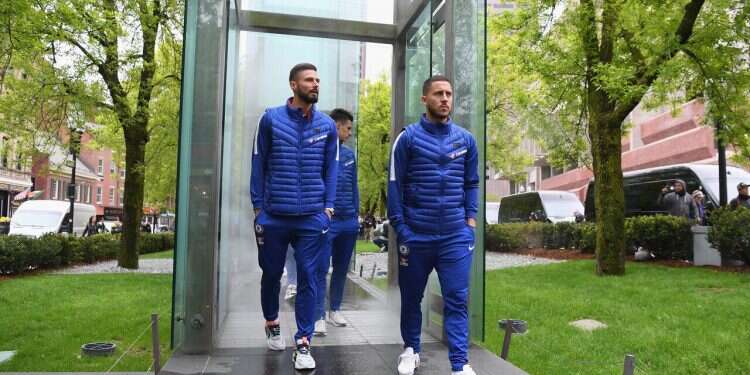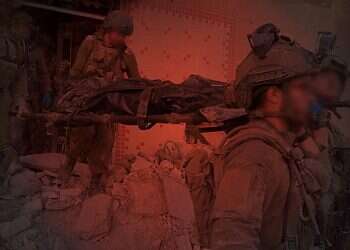Asked why soccer clubs get involved in social initiatives, Bruce Buck, the chairman of the Chelsea Football Club, offers a simple answer: Didier Drogba.
Drogba, for those who haven't been paying attention to world soccer over the past two decades, was the Ivory Coast striker who played for Chelsea from 2004 to 2012, the club's golden age during which the 2004-2005 season, for the first time in 50 years, Chelsea won the England Football League Championship. It then went on to win again the following year -2005-2006 and again in the 2009-2010 season.
Buck cites a poll from a few years back that found that the most famous African of all time was the late South African President Nelson Mandela. Drogba was second.
Drogba became hugely popular not only due to his phenomenal ability as a striker on the field, but mainly due to his national leadership: In his 20s, he led an effort to end the civil war in his country, calling on leaders, often right after a match, to end the conflict between Christians and Muslims. His efforts bore fruit, and today, Drogba is admired across the Ivory Coast and the entire African continent.
When Buck talks about Drogba, it is clear that social initiatives can be more effective when they involve soccer stars and not politicians. With one quick selfie, a player with 20 million followers on Instagram can do more than any address at the U.N. General Assembly could ever hope to achieve. The connection between star athletes and their fans is almost mystic, and it is thanks to this mysticism that messages can be disseminated with remarkable efficiency.
It is therefore clear why Chelsea bothered making the trip across the Atlantic Ocean to Boston just two weeks before an important qualifier in the UEFA Champions League to take part in "Final Whistle On Hate," a charity match against the New England Revolution soccer team. The game wasn't part of some hollow public relations campaign, but rather another stop in the "Say No to Anti-Semitism" initiative, which the English club takes very seriously.
An international effort
Chelsea's anti-Semitism initiative was launched in Jan. 2018 by the club's owner, Russian-Israeli Roman Abramovich. He was eager to take action in light of the many reports of anti-Semitic incidents in Europe and urged the heads of the team to enlist the club in the battle for hearts and minds. The first body the club turned to on the subject was the World Jewish Congress and its president, Ron Lauder, one of the most influential Jews in the world.
Since the launch of the program, the players have met with Holocaust survivors, visited concentration and death camps and even taken part in the March of the Living at the Auschwitz-Birkenau death camp. The players, some of who learn about the problem of anti-Semitism for the first time in their lives through the club, meet with children at elementary schools in cities around the world. They combine messages against anti-Semitism with those aimed at empowering children.
The year 2018 was a particularly troubling year as far as anti-Semitic incidents are concerned, with a 69% increase in hate crimes in France and an 11% increase in Germany. These statistics also include incidents that took place in the stands of soccer stadiums, which have always been fertile ground for uncontrollable nationalist and racist outbursts.
In a conversation with Buck shortly after the gala event held the afternoon of the Chelsea-Revolution charity match, he makes it clear that it is, in fact, the diversity of Chelsea's players – who come from 11 countries, among them including Spain, Belgium, Argentina, Brazil and Croatia – that makes the message so effective.
"The international character of our players intensifies the message that we want to get across against hate because it takes advantage of the popularity of these players in so many countries. The players draw attention anywhere they go. They are the main part of this initiative, and they are very important to its success," Buck said.
Q: How do you "educate" fans who used violence in the stands? You've made it clear you won't automatically remove them from the stands because there would be negative repercussions in the long run.
"First of all, it is important for me to make clear that there is no minor incident when it comes to discrimination, racism or anti-Semitism. Every incident is significant. But we examine each case individually, and if we identify an incident that took place because of a lack of attention or thoughtlessness, we tell that person that if they recognize the fact that they did something wrong, and agree to go through our educational program, then we are willing to weigh their punishment. Of course, if it's a serious crime, there are other consequences."
Luiz's mission
On the day before the game, the Chelsea players went to visit the New England Holocaust Memorial, which is located in the heart of Boston. Eden Hazard, Gonzalo Higuaín, Pedro Eliezer Rodríguez Ledesma and other stars walk under the six transparent towers of the monument, whose glass walls are inscribed with quotes from survivors, as steam rises from the floor. When their guide asked how they could help the preserve the memory of the Holocaust, Chelsea's Brazilian striker, and the undisputed leader of the club, David Luiz , said, "As footballers, we are committed not just to winning but also to helping people."
The charity match against New England, which Chelsea won 3:0, was the highlight of the soccer club's campaign. It was made possible thanks to Abramovich's ties to Robert Kraft, the Jewish owner of the NFL team the New England Patriots as well as to the New England Revolution.
As part of the events leading up to the match at Gillette Stadium, Abramovich and Kraft announced they would each donate $1 million to the continued efforts against anti-Semitism. The current emphasis is on expanding activity in the U.S. The timing of the game was chilling, as it took place just two weeks after the shooting attack on the Poway Chabad that killed Lori Gilbert Kaye, and six months after 11 congregants were gunned down at the Tree of Life Synagogue in Pittsburgh.
Kraft told me that he was in Pittsburgh just one week after the Pittsburgh shooting for a game the Patriots were set to play against the Steelers.
"It was more important for me to come to the synagogue on Shabbat, to be called up to the Torah and embrace the congregants than to be with the team," he revealed. While the Patriots would lose that game, Kraft notes "that didn't prevent us from winning at the end of the season in the Superbowl."
In his opening remarks to a panel on the war on anti-Semitism held the afternoon of the game and attended by Israel's Ambassador to the U.N. Danny Danon and Jewish Agency Chairman Isaac Herzog, Kraft quoted the sages in Hebrew. "There is no evil without good," he said. On that Saturday in Pittsburgh, Kraft said he told people he would try to bring something good out of this tragedy. "That was the catalyst for this game," he said, "the power of sports to bring people together and send a positive message."
Another figure who found a personal angle in their much-publicized visit to the East Coast was Major League Soccer Commissioner Don Garber. Garber, himself a Jew, reveals that four out of the past eight MLS commissioners have been Jews and that his appointment sparked anti-Semitic comments on Twitter. Nevertheless, he emphasized that the situation in American sports is much better than in Europe.
"It's horrible that in Italy, bananas were thrown at black players. If something like happened in the NBA, it would be on the front page of all the newspapers, and the league would go on strike," he said.
Garber explained that the MLS encourages teams to get involved with social issues, but as a representative of the league, he is cautious. Following the 2016 attack on a gay nightclub in Orlando, he allowed the groups who played in the city to stop the match at the 49th minute of the game for a minute of silence for the 49 victims of the attack and even use the LGBT flag in place of the MLS flag.
"After the match, they asked me if I could put out flags with a Star of David or a cross on them if a massacre took place in a synagogue or a church. That question made it clear to me that I needed to take one step back in terms of the league's involvement."
A call to action
In Boston following a series of stops throughout Europe, Elan Carr, the U.S. State Department's envoy on anti-Semitism, said he was happy to reveal that "many leaders understand that anti-Semitism is a threat not just to Jews but also to their countries and all of Europe."
Nevertheless, Carr said it was of the utmost importance they shift from talking about the threat to taking action.
Q: Would you say the charity match and the event here came at a necessary time, following the attack on the Chabad of Poway?
"There is no such thing as bad timing when it comes to the war on anti-Semitism. … Anti-Semitism exists in all of the ideological camps. It is a global crisis, and that is why Abramovich and Kraft are leaders. Jews need to fight for their own interests and that is the problem because there are quite a few Jews who are in favor of "tikkun olam" (repairing the world), but fixing their own family – that they aren't prepared to do."
Q: Of all the issues on U.S. President Donald Trump's agenda, where does anti-Semitism stand?
"It's at the top of the agenda. The best example of that is the last State of the Union address, in which he dedicated a broad portion to his commitment to the fight against anti-Semitism. After the Pittsburgh massacre, the president said that all those who persecute the Jews, we will persecute them. That is a promise we haven't heard from a U.S. president in the past – the force of a global power directed at anti-Semitism. President Trump is committed to that, not just him, but also Vice President Mike Pence and my boss, Secretary of State Mike Pompeo."




